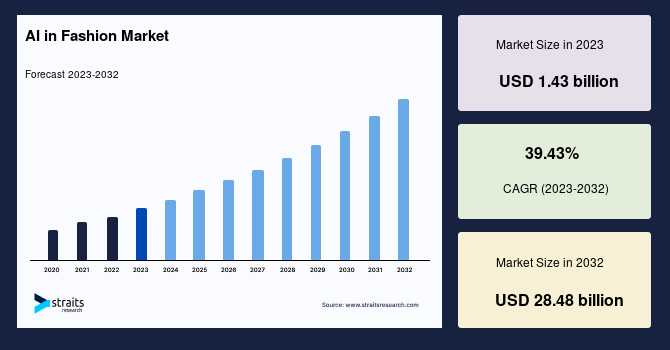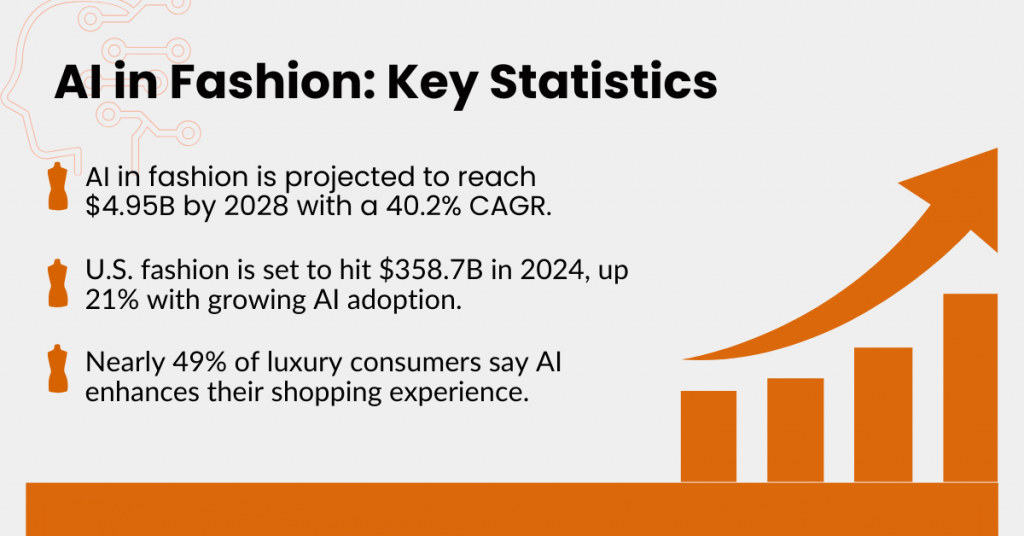Every sector in the modern world is using AI to stimulate innovation and propel changes in its operational procedures. One of the industries embracing AI in fashion.
AI has become progressively embedded into the fashion sector, making it a bit more practical rather than just a futuristic concept, and is changing the way we buy, create, and interact with fashion.
AI in fashion industry provides massive tools to develop creativity and efficiency in every facet of the industry. From trend prediction and design enhancement to supply chain management, artificial intelligence is transforming established old fashion techniques. By using artificial intelligence to examine consumer preferences and create original design concepts, designers may now accelerate the design process and increase the responsiveness to client demand.

Meanwhile, on the consumer side, AI is opening the door for personalized shopping. Recommendations via AI let shoppers find what works for them, and the brands learn what people are purchasing. Also making waves in the sustainability initiative AI empowering the brands to streamline the manufacturing process, reducing wastage, and also creating possible sustainable materials. As both the digital and physical worlds continue to merge, fashion industry professionals are adapting AI solutions in order to stay ahead.
In this blog, we’ll explore how AI is shaping the future of fashion, use cases of AI in fashion and what it means for the industry’s next chapter.
Table of Contents
AI in Fashion: Key Statistics
- The AI-driven fashion market is on track for rapid expansion, with projections indicating it will reach $4.95 billion by 2028, growing at a robust compound annual growth rate (CAGR) of 40.2%.
- In the United States, the fashion industry is set to hit a market value of $358.7 billion by 2024, marking a significant 21% growth compared to 2023. This surge reflects the industry’s ongoing evolution and the growing integration of advanced technologies, including AI.
- Nearly 49% of luxury consumers believe that brands incorporating AI deliver a superior shopping experience.

Use Cases: AI in Fashion
AI for fashion industry, improving processes from design to customer experience. AI has also added a new touch of experience to fashion brands by bringing in advanced technologies to the fashion brand like machine learning and computer vision, rolling up efficiency, creativity and personalisation up a notch. Below are the potential use cases of AI in fashion that are transforming fashion with AI.
1. Fashion Design and Product Development
AI will transform the fashion design process by means of more efficiency and creative capacity. For designers, experimenting with theoretical materials, patterns, and colors will become easy with AI systems that provide design recommendations. They can also optimize patterns to enhance material efficiency and reduce waste. AI virtual prototypes take clothes making in a new direction, allowing designers to visualize garments before they go into manufacturing, speeding up how the prototyping phase can work with limited, costly iteration loops.
Artificial intelligence also assists in forecasting the designs and trends that consumers are most likely to purchase based on data insights, thus ensuring that the designs can be in sync with the market trends. This strategy guarantees that designs are both fashionable and sustainable and easily combines originality with shortening the whole product development cycle, therefore expediting the time to market.
2. Virtual Try-On and Fitting Rooms
Consumers have begun to shop their closets online with virtual try-ons transforming the fashion experience. Thanks to AR and VR, clothing items are digitally turned into avatars, which means customers are able to try the clothes virtually without having to set foot inside a store. Now the guesswork can be taken out of the online shopping experience with a simple 3D model of these garments on your body.
Moreover, virtual try-ons minimize returns, which is a prevalent problem in eCommerce. As more retailers adopt it, artificial intelligence in fashion will contribute to a better customer experience, better sales, and a more sustainable retail model through reduced waste and returns.
3. Personalization and Recommendation Engines
Artificial intelligence is transforming fashion retail by offering personalized experiences. Retailers use AI recommendation engines, past purchase behavior, and customer data—such as browsing history—to promote apparel that matches individual consumer tastes. These custom recommendations increase consumer engagement and drive sales. AI also powers bespoke design tools that allow users to personalize their apparel, including fabric, color, and embroidery.
Such a high level of customization results in bespoke products that talk to each individual consumer about their distinct styles and, consequently, a higher engagement with the brand. A shopping experience that caters to their needs, prompting them to return and ensuring brand loyalty. As AI advances, fashion brands can optimize customer experiences, improving satisfaction and generating exclusivity.
4. Inventory and Supply Chain Management
AI in fashion industry contributes significantly to optimizing the inventory and supply chain management in the fashion industry. Artificial intelligence can make more accurate demand forecasts by analyzing vast amounts of data, such as historical sales, inventory levels, and external factors like weather patterns and market trends. This aids retailers in preventing stockouts or excess stock and makes sure products are available to customers when they desire them, without excess stock.
These AI-based tools are also used in logistics to recommend the routes for delivery and suggest the best shipping method. All of this translates to savings, less waste and more sustainable practices. AI can also speed up the decision-making process by automating mundane tasks, leaving human workers free to engage in higher-level and more strategic activities. AI enables fashion brands to evolve dynamically in tandem with their consumer base since they can operate more accurately and accurately.
5. AI in Marketing and Customer Engagement
By analyzing vast amounts of data like purchase history, browsing behavior, and demographics, artificial intelligence aids in the creation of very customized marketing campaigns. The system can target adverts to groups of consumers around specific kinds of products, provide tailored product recommendations, and suggest styles on-site. This tailored marketing improves customer experience and propels the conversion probability.
One of the other use cases of AI in fashion is prediction of consumer behavior, that is, it can help the brands in real-time modification of their marketing strategies. AI-driven chatbots interact with customers, answering their queries, suggesting products, and helping customers navigate on their purchasing journey. Instead, it allows AI to help fashion brands build an emotional connection with their valued customers, which in turn increases the customer loyalty, engagement, and sales.
6. Sustainable Fashion Initiatives
As more companies focus on sustainability, AI for fashion is supporting environmentally friendly activities, therefore strengthening its role as a main force behind fashion innovation.
Using AI-based solutions, businesses may track and verify their inputs’ source, guaranteeing ethical procurement and adherence to environmental criteria. With its ability to analyze supply chain data, AI can detect opportunities for a brand to make changes to avoid environmental impacts, ultimately maximizing the reduction of waste and carbon footprints.
7. Predictive Trend Forecasting
Artificial Intelligence has changed the way fashion trends are forecast; now, brands are able to predict future trends with more precision.
Using information gathered from social media platforms, fashion blogs, historical sales data and consumer reviews, artificial intelligence algorithms can spot up-and-coming trends and forecast just which styles, colors and fabrics will be in style for the next season.
Such a data-driven technique lets the fashion labels calculate with exactness and assess on what to stock and manufacture, reducing the risk and optimizing the profits. By predicting changes in consumer behavior, AI systems help businesses to keep current with trends and modify their products.
Fashion companies can create more links to consumers and their demand items using predictive trend forecasting, thereby reducing unsold stock rate and improving sales outcomes.

8. Dynamic Pricing Models
AI-assisted dynamic pricing helps fashion retailers change prices in real-time according to demand, market conditions, and competitor pricing. AI helps interpret huge data sets to find the best price for a product, so revenue and profit can be maximized and competition avoided. AI can raise prices for hot products in peak seasons or when a promotion ends and lower prices for slow-moving stock to increase sales.
This kind of flexibility helps stores to maximize price policies with the least possible human involvement. To personalize offerings and improve the experience, artificial intelligence can also consider consumer buying behavior and loyalty. In a fast-paced industry, dynamic pricing enables fashion companies to keep profits and satisfy demand while maintaining a desired in-demand state.
9. Chatbots for Customer Service
Chatbots not only assist you in effective marketing, but they also provide a great customer service experience to your fashion shoppers. Driven with artificial intelligence, these chatbots can most crucially help your guests right away and 24×7. From product inquiries to guided shopping, these virtual companions can help consumers with anything. Furthermore, improving the shopping experience is the ability of chatbots to offer tailored recommendations depending on consumer behavior.
AI-powered chatbots can independently answer the typical challenges — including but not limited to order tracking, return request and size-related queries. This enables shorter wait times and improved customer experience. Chatbots today are able to process more complex tasks, like suggesting customizations or styling solutions. For fashion brands, this will minimize operating costs while increasing the overall efficiency of the business process, leaving shoppers with a smoother experience thanks to AI-powered customer service.
10. Intelligent Returns Management
Artificial intelligence in fashion is literally enhancing returns management by leaps and bounds in fashion. Returns are a longstanding pain point for online retailers as customers regularly send items back for incorrectly fitting products or to compare to the item expected to be received. AI solves these problems by forecasting the return probability using data that involves the historical sale record, how customers used that product, and the characteristics of that product.
By suggesting appropriate sizes and offering a virtually fitting room experience, AI can help consumers buy. In addition, AI-based solutions also help to speed the whole process by automating the returns process, which hastens the process and aids both consumers and stores in a prompt process experience with effectiveness. AI will glean the patterns and highlight potential improvements, like do I need to add more on product descriptions, images, fit, or details? This leads to reduced returns, decreased cost of operations, and increased customer delight.
11. Body Shape Recognition for Fit Precision
AI in fashion is involved in very exciting applications, and one of which is body shape recognition. Conversely, artificial intelligence systems can look at body shape and size to make more suitable and stylish recommendations for consumers. AI creates a virtual model of the user using 3D body scanning and machine learning so that he or she may select a fitting wardrobe for their particular body type. Say bye to the size discrepancies.
These AI-powered solutions advise specific fabrics, cuts, and sizes depending on the body type of the customer to inspire him or her to make confident purchases. This technology also allows businesses to produce clothes in a variety of sizes, therefore broadening the inclusion of body types. By giving consumers a more accurate and personalized buying experience, body form identification helps to increase customer happiness and minimize returns.
12. Waste Reduction in Manufacturing
With unwanted garments being one of the largest problems, the fashion industry has now turned to AI to aid its combat in waste reduction. AI also enables fashion brands to optimize production procedures that would minimize to a certain degree fabric wastes, eliminate overproduction, and increase manufacturing efficiency. The needles of the future with artificial intelligence can scan information from past collections, sales fluctuations, and fabric consumption to give us a more precise forecast of the quantity of fabric that should be used per garment.
Major causes of fashion waste include unsold inventory waste and material waste; hence, it also reduces these areas. In addition, AI can identify opportunities to enhance manufacturing operations to reduce the environmental impact of the production process and further reduce energy consumption. Using technology as a driver will be very important in adapting its business model towards a sustainable one and turning this into profitability for fashion businesses. Businesses cutting waste with an AI-led approach will build a more sustainable fashion ecosystem.
Benefits of AI in Fashion Industry
AI technology has greatly transformed the fashion industry by providing various benefits that have completely changed how fashion companies operate. Automation of workflows powered by AI has simplified processes, while reducing errors made by manual and also increasing efficiency. AI advancements within the fashion sector provide personalized advice which allow clients to receive personalized fashion guidance. AI in fashion industry can also facilitate the design of fashion products that are customized which are tailored to each person’s individual tastes and dimensions. Below are a few advantages that come from artificial intelligence in fashion industry:
1. More Personalization
With AI, brands can customize their products as well as services to match the individual taste of the customer. Through the analysis of consumer behavior and purchase history, it can suggest clothing, accessories, and styles that fit each customer and their unique preferences, which improves customer satisfaction and loyalty.
2. Better Inventory Management
AI for fashion also helps to optimize inventory management in fashion industries. AI is used to predict demand by analyzing trends, sales patterns, and consumer preferences. The brands will also be able to follow through with unsold inventory, therefore reducing wastage and making their operations process efficient altogether.
3. Design Process
AI helps designers by using data from current trends, materials, customer preferences, etc. Armed with this treasured intel, AI then recommends design ideas, color palettes, and materials to align with marketplace needs. As a result, it improves workflow, resulting in designs that fulfill the customer’s needs and the fashion at that time.
4. Enhanced Customer Engagement
Another advancement of AI in fashion that is of great importance is chatbots and virtual assistants, which are already taking customer service to the next level. They are available 24/7 to instantly respond to queries, provide styling tips, and assist with product recommendations. This directly translates to enhanced customer satisfaction, higher engagement, and stronger brand loyalty, as the customers feel supported at every stage of their journey.
Case Studies: Real-World Examples of AI in Fashion
The use of AI in fashion is increasingly being adopted by some of the leading fashion brands to optimize their marketing campaigns and personalize the consumer experience. AI enables them to create quality images, rework their marketing strategies, and provide hyper-personalized services. Artificial intelligence in fashion is creating possibilities and also bringing efficiency in the fashion industry from digital fashion to personalized products.
Case Study 1: The Fabricant’s Digital Fashion Collections

The Fabricant is a pioneering digital fashion house that creates garments that exist only in a digital center. Using 3D design tools and artificial intelligence, they create incredibly intricate virtual fashion collections, which customers can wear in virtual reality, making fashion more accessible and innovative.
Case Study 2: Adidas’ Speedfactory

Using AI and robotics to change the way shoes are made speeds up production processes while enabling considerable customization. Consumers can provide feedback on design decisions, making the product cycle quicker and much more customized, and enhancing the consumption experience altogether.
Case Study 3: SEDDI’s Textura AI-Powered Textile Digitization Platform

SEDDI Textura translates physical fabric using AI into a digital format so it functions in virtual fashion design. Textura accurately creates fabric textures and properties by training all its AI algorithms through vast datasets, sourced from different fabrics, that allows designers to simulate textiles for digital garment creation to a high degree of accuracy.
Challenges of Implementing AI in Fashion
It’s clear that the incorporation of AI in the fashion industry offers enormous opportunities, but it is also vital to address its challenges. While AI will drive the fashion industry, the challenges should be approached carefully to ensure that AI acts positively and responsibly within the industry.
Data Privacy
Data privacy is one of the biggest pain points that arise in implementing AI in fashion. AI models consume huge amounts of personal data, so handing over that data to AI in the fashion sector has to be done with a focus on consumer privacy. Companies must follow strict data security protocols to earn trust, keeping all their sensitive data safe and adhering to various regulations governing privacy.
Consideration
Application of AI in fashion industry brings ethical concerns, especially in perpetuating harmful beauty standards. AI algorithms are generally trained on historical data, which risks entrenching bias and stereotypes. Fashion brands must use diverse and inclusive data sets to create more ethical, representative, inclusive, and body-positive fashion.
Job Displacement
AI may bring efficiency and innovation but could also mean mass job displacement in the industry, filled by machines. On the flip side, AI has the potential to provide creative job roles. AI is optimising productivity processes and automating mundane, repetitive tasks, which enables staff to engage in more creative tasks.
Future of AI in Fashion Industry
Unquestionably, the fashion business’s AI future looks to be really bright and fascinating. From promoting sustainability, to improving creative processes, artificial intelligence is poised to alter how fashion companies run, create, and interact with consumers. The following are key trends that will likely dominate the industry in the coming years.
Sustainability
The impact of AI on sustainability in fashion AI will completely change the game when it comes to optimizing supply chains, decreasing waste, and production efficiency. They can analyze consumption trends, predict demand, and optimize production while cutting the number of overproduced products, which means the impact on the climate drops with AI. It will help bring sustainable practices for fashion companies, giving rise to an innovative yet environmentally friendly fashion future.
Influencer Marketing
Application of AI in fashion industry will have a leading role in influencer marketing going forward. AI can enable brands to identify influencers they should partner with by analyzing social media trends and engagement data. Driven by data, this approach would allow fashion firms to reach the right audience, get higher campaign return on investment (ROI) and strengthen consumer-brand connections.
AI-Generated Fashion Design
The creative aspect of fashion design will be influenced heavily by AI that is creating new styles and ideas. In this process, you can upload images of existing clothes into AI systems so that they can cross-mix various aspects and suggest unique combinations. AI in fashion design might even throw up something entirely new in the fashion world, a fresh category born of creativity.
Predictive Trend Analysis
In the future, AI for fashion will be even better at predicting fashion trends. Using the voluminous amounts of data collected from social media, runway shows, and consumer behavior, AI is able to predict trends with amazing accuracy. Fashion brands can use these insights to create highly demanded collections, remain ahead of market movements, and improve their competitive advantage.

How A3Logics Can Implement AI in Fashion Industry
A3Logics is a reputable enterprise AI development company that is poised to help the fashion industry harness the power of AI with tailored solutions that tackle the specific challenges fashion brands face. AI can change the way fashion business operates, from personalising customer experiences to optimizing inventory. A3Logics offers professional artificial intelligence development services to support brands in making data-driven decisions to maximize engagement, optimize operations, and enhance automation.
From employing AI for customer service chatbots to predictive trend analysis to automated design processes, A3Logics integrates these AI systems into your existing infrastructure, letting your operations run effortlessly. Fashion companies that reap the benefits of AI technologies can scale across the value chain and will be future-ready, adapting quickly to market changes while enhancing their creative processes. A3Logics works alongside brands to develop AI strategies that fit their goals and help them stay ahead of the competition.
Ready to elevate your fashion business with AI? Reach out to A3Logics and let’s explore how we can transform your company with cutting-edge enterprise AI chatbot development services tailored to your needs.
Conclusion: AI in Fashion
Artificial intelligence is reshaping the fashion industry in ways we never imagined. AI-based tools and cutting-edge algorithms are revolutionizing the process of design, offering modern solutions for more innovative ways of creating fashion. From AI-generated clothing to trend forecasting, technology is becoming deeply integrated into how AI in fashion design is conceived, made, and marketed. While challenges like data privacy and job displacement are important issues that need addressing, the potential benefits far outweigh these concerns.
Beyond only increasing operational efficiency, artificial intelligence in fashion is helping environmental initiatives, providing more customized shopping experiences, and creating fascinating new design and creative opportunities. The fashion business is about to undergo a significant change as artificial intelligence technology develops, where synthetic media and digital fashion will play a key role in shaping the future.
Fashion brands that embrace AI now will position themselves as industry leaders. They can remain competitive by employing AI solutions to streamline operations, predict trends, and provide tailored customer offerings to capture market share and grow revenue. AI will be an invaluable resource in the near future for businesses that wish to innovate and remain relevant within an ever-evolving and competitive environment.



![20 Best Healthcare App Development Companies [2024-2025]](https://www.a3logics.com/wp-content/uploads/2023/10/20-Best-Healthcare-App-Development-Companies-2023-2024.webp)

